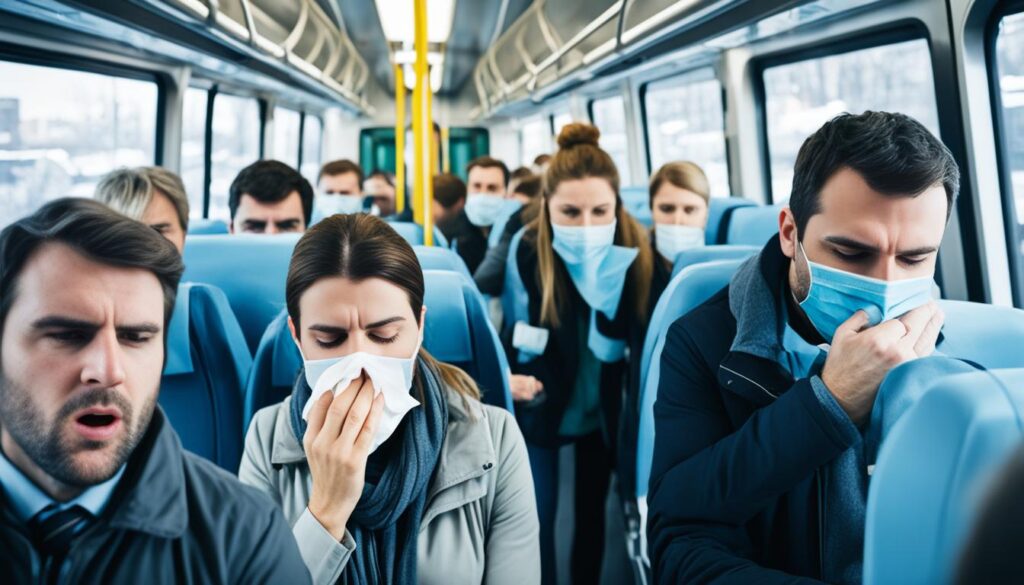As the flu season comes closer, it’s key to act early to keep you and others safe. I’ll share tips on how to prevent the flu, from knowing the virus to boosting your immune system and handling symptoms at home. By using these expert tips, you can stay healthy and strong all season.
Key Takeaways
- Learn about flu symptoms and how it spreads to protect yourself.
- Make sure to get your flu shot every year to lower your chance of getting sick and serious flu.
- Boost your immune system with healthy foods and manage stress to fight off illness.
- Keep clean with good handwashing to stop the flu from spreading.
- Drink plenty of water, rest well, and treat flu symptoms early to help you get better.
Understanding the Flu Virus
Influenza, or the flu, is a contagious illness that affects the respiratory system. It’s caused by viruses. Knowing about the flu virus helps us prevent it and know when to get help.
Common Flu Symptoms
The flu can cause many symptoms like fever, cough, and sore throat. It can also lead to serious issues like pneumonia or respiratory failure.
It’s key to recognize flu symptoms early. This helps in getting treatment and stopping the virus from spreading. People with these symptoms should rest, drink plenty of water, and see a doctor if things get worse or don’t get better.
How the Flu Spreads
The influenza virus spreads mainly through droplets from coughing, sneezing, or talking. It can also spread by touching something touched by an infected person. The virus can live on surfaces for hours. So, it’s important to protect against it and prevent respiratory illnesses.
Knowing how the flu spreads helps us lower our risk. We can do this by washing our hands often, avoiding people who are sick, and staying home if we’re feeling unwell.
| Flu Symptoms | Influenza Transmission |
|---|---|
|
|

“The flu virus can be a formidable adversary, but by understanding its nature and how it spreads, we can better protect ourselves and our communities.”
Importance of Flu Vaccination
Getting an annual flu vaccine is key to keeping you and your loved ones safe from the flu virus. The vaccine helps fight against the most common flu strains expected this season. It’s a powerful way to stop getting sick and lessen symptoms.
Research shows the flu vaccine can cut the risk of getting the flu by up to 60%. Even if it doesn’t stop the infection, it can make the illness shorter and milder. This can save lives and ease the load on hospitals.
People at high risk, like the elderly, young kids, pregnant women, and those with health issues, need the vaccine most. It helps keep them safe and lowers the risk of serious illness or hospital stays.
| Vaccine Effectiveness | Reduction in Flu Risk |
|---|---|
| Flu Vaccine | Up to 60% |
| Flu Vaccine (Reduced Severity) | Significantly lower duration and intensity of illness |
The flu vaccine is a safe, effective way to shield yourself, your family, and others from the flu’s harm. By choosing to get vaccinated, you help keep everyone healthy and support public health.

“The single best way to protect against the flu is to get vaccinated each year.”
– Centers for Disease Control and Prevention
Boosting Your Immune System
Keeping your immune system strong is key to fighting off the flu virus. Eating foods full of important nutrients and managing stress well can help. This makes your body’s defenses stronger and boosts your health.
Nutrients for Immune Health
Eating a diet full of these nutrients can really help your immune system:
- Vitamin C: You can find it in citrus fruits, bell peppers, and leafy greens. It helps immune cells grow and work right.
- Zinc: This mineral is vital for making and activating immune cells. Good sources are oysters, red meat, and whole grains.
- Vitamin D: Known as the “sunshine vitamin,” it’s key for immune system health. You can get it from fatty fish, eggs, and fortified dairy.
- Probiotics: These good gut bacteria help your immune system by keeping your digestive system healthy. Try yogurt, kefir, and fermented veggies for them.
Stress Management Techniques
Too much stress can hurt your immune system, making you more likely to get sick. Here are ways to help manage stress:
- Practice mindfulness and meditation: Spend some time each day to calm your mind, breathe deeply, and focus on now.
- Engage in regular physical activity: Exercise lowers stress and boosts immune function by improving blood flow and releasing endorphins.
- Get adequate sleep: Aim for 7-9 hours of good sleep each night. Sleep is important for immune system health.
- Seek social support: Being with friends, family, or a group can help you handle stress and stay positive.
By focusing on your immune health and using these tips, you can protect yourself from the flu and stay healthy.

| Nutrient | Key Function | Food Sources |
|---|---|---|
| Vitamin C | Supports the growth and function of immune cells | Citrus fruits, bell peppers, leafy greens |
| Zinc | Essential for the development and activation of immune cells | Oysters, red meat, whole grains |
| Vitamin D | Regulates the immune system | Fatty fish, eggs, fortified dairy products |
| Probiotics | Support a healthy gut and immune function | Yogurt, kefir, fermented vegetables |
“Strengthening your immune system is one of the best ways to protect yourself against the flu and other illnesses. By focusing on a balanced diet and effective stress management, you can take proactive steps to improve your overall health and resilience.”
Practicing Good Hygiene
Keeping clean is key to stopping the flu from spreading. One top way to protect yourself is by washing your hands well. Just by doing a few simple things, you can cut down your risk of getting or giving the flu.
Hand Washing Techniques
The Centers for Disease Control and Prevention (CDC) suggest these steps for washing hands:
- Wet your hands with clean, running water (warm or cold), and apply soap.
- Lather your hands by rubbing them together with the soap. Make sure to cover the backs of your hands, between your fingers, and under your nails.
- Scrub your hands for at least 20 seconds. Sing the “Happy Birthday” song from start to end twice to make sure you’ve washed long enough.
- Rinse your hands well under clean, running water.
- Dry your hands using a clean towel or let them air dry.
Washing your hands right is key to avoiding the flu and staying healthy. Adding this easy habit to your daily life can really help in preventing the flu and keeping you well.

Also, keeping clean by covering your mouth when you cough or sneeze helps lower the chance of spreading the flu. By focusing on these easy steps, you help keep your community healthy and protect your family and friends during flu season.
“Proper hand hygiene is one of the most effective ways to prevent the spread of infectious diseases, including the flu.”
Avoiding Flu Hotspots
Getting through the flu season can be tough, but knowing where the flu spreads most helps a lot. It’s key to avoid crowded or poorly aired places to lower the chance of getting the flu. This is important for staying healthy.
One top way to protect against the flu is to dodge places where it spreads easily. These spots have lots of people, bad air flow, and close contact. Knowing these areas helps us avoid getting sick and keep up with flu prevention.
- Crowded places like malls, theaters, and public transport are more likely to spread the flu.
- Indoors with bad air flow, like small offices or classrooms, help the virus spread fast.
- Hospitals, nursing homes, and places with sick people are especially at risk for flu outbreaks.
Avoiding these risky spots or being extra careful when you go there can really help with flu prevention. Being aware and careful is the best way to get through the flu season safely and keep healthy.

Staying Hydrated and Rested
Keeping up with flu prevention and health tips means drinking enough water and sleeping well. These steps are key to keeping your immune system strong. They also help if you get sick.
Drinking enough water is vital for removing toxins, keeping your body cool, and helping organs work right. Try to drink at least eight 8-ounce glasses of water daily. If you’re sick, drink more. Herbal teas, soups, and juicy fruits can also keep you hydrated.
Getting enough sleep is just as crucial. Not sleeping well can make you more likely to catch the flu. Aim for 7-9 hours of good sleep each night. Adding relaxation techniques like meditation or yoga can help you sleep better.
- Drink plenty of water to stay hydrated
- Consume water-rich foods like fruits and vegetables
- Aim for 7-9 hours of quality sleep per night
- Practice stress-reducing activities to improve sleep quality
Focus on staying hydrated and rested to help your body fight the flu and heal faster. Add these easy health tips to your flu prevention plan for better health.

“Staying hydrated and well-rested is the foundation for a robust immune system, which is essential for battling the flu.”
Managing Flu Symptoms at Home
When you get the flu, it’s best to stay home and rest. The flu can be tough, but there are ways to manage your symptoms at home. By using over-the-counter remedies, you can ease your flu symptoms and recover faster.
Over-the-Counter Remedies
Over-the-counter medications can help with cold and flu symptoms. Here are some common ones:
- Pain relievers and fever reducers, like acetaminophen or ibuprofen, to ease aches, pains, and fever
- Decongestants to clear nasal congestion
- Cough suppressants to reduce coughing
- Antiviral medication like oseltamivir (Tamiflu) or zanamivir (Relenza), which can shorten the flu if taken early
Always follow the package instructions and talk to a doctor if you’re unsure or have health concerns. Using these health tips wisely can help a lot and support your body’s healing.
“The flu may be unpleasant, but with the right home remedies, you can manage your symptoms and get back to feeling your best.”
Remember, over-the-counter remedies can help with flu symptoms, but they don’t cure the virus. If your symptoms don’t get better or get worse, you should see a doctor. By taking care of yourself and getting professional advice, you can beat the flu and take care of your health.
Protecting Vulnerable Populations
During the flu season, it’s key to focus on protecting those who are most at risk. This includes the elderly, young kids, and people with health issues. They’re more likely to get severe flu or other respiratory illnesses.
To keep these groups safe, we need to reduce their chance of getting the flu virus. Encouraging them to get the flu vaccine is a big step. Also, teaching them about good hygiene like washing hands often can help stop the virus from spreading.
For the elderly, making sure they get the medical care they need is vital. This means helping them with things like getting to doctor’s appointments, managing their meds, and checking in on them regularly.
Parents of young kids should learn how to keep their children safe too. This means taking steps like limiting their social contact, avoiding crowded places, and watching for any signs of sickness.
By working together and focusing on our most vulnerable, we can make a big difference. We can help them stay strong and fight off flu and other illnesses during the tough flu season.

“Protecting the most vulnerable among us is a moral imperative, and it’s up to all of us to ensure they stay healthy and safe during the flu season.”
When to Seek Medical Attention
Knowing when to get medical help for the flu is key. Most flu cases can be treated at home with rest and over-the-counter medicines. But, some flu symptoms need a doctor’s care.
If you notice any of these, see a healthcare provider:
- Difficulty breathing or shortness of breath
- Persistent or high fever (over 101°F or 38.3°C)
- Severe or persistent vomiting or dehydration
- Confusion or sudden dizziness
- Chest or abdominal pain
- Worsening of pre-existing medical conditions, such as heart disease or diabetes
Your doctor might suggest antiviral medication for these symptoms. Antiviral drugs like Tamiflu or Relenza work best if taken early, within the first 48 hours of getting sick.
Some people, like young kids, older adults, or those with weak immune systems, need quick medical help. Acting fast ensures you get the right health tips and treatment to fight the flu.

“Early treatment with antiviral medication can significantly improve the outcome for individuals with the flu, especially those at high risk of complications.”
Flu Prevention in the Workplace
As the flu season comes, it’s key for employers and employees to work together. We need to keep our work places healthy and stop the virus from spreading. By using simple but effective steps, we can keep ourselves and our coworkers safe from the flu.
Employer-Led Initiatives
Employers should lead in promoting flu prevention at work. This includes:
- Offering on-site flu vaccination clinics for easy access to shots.
- Providing hand sanitizers, disinfecting wipes, and face masks for good hygiene.
- Encouraging employees to stay home when sick, without fear of being judged.
- Setting up flexible work-from-home options during the flu season.
Individual Actions
Employees also have a big role in stopping the flu at work. Here are steps we can all take:
- Wash your hands often with soap and water, or use hand sanitizers.
- Cover your mouth and nose when coughing or sneezing, and throw away tissues right.
- Avoid touching your face to stop the virus from getting in.
- Keep a healthy life by sleeping well, eating right, and managing stress.
By working together on these flu prevention steps, we can make our workplaces safer and more productive during flu season. Remember, flu prevention, health tips, and virus protection help keep our workplaces healthy and successful.

Preparing for Flu Season
As the colder months come, it’s time to get ready for flu season. Being prepared can help you stay healthy and avoid flu symptoms. Make sure your home has the right supplies and medications to fight the flu.
Stocking Up on Essentials
Getting the right supplies is crucial for flu season. You should have over-the-counter meds like pain relievers and cough medicines ready. Also, keep a first-aid kit with tissues, thermometers, and drinks to help with electrolytes.
- Pain relievers (e.g., acetaminophen, ibuprofen)
- Decongestants and cough suppressants
- Tissues, hand sanitizer, and disinfecting wipes
- Thermometers and electrolyte-replenishing drinks
Having these items ready helps you tackle flu symptoms fast. It keeps your family comfortable while they recover.
Don’t forget to stock up on non-perishable food like canned soups and juices. This way, you can keep up with nutrition and hydration if someone gets the flu.
“Preparation is the key to weathering the flu season successfully. By taking the time to stock up on essentials, you can focus on recovery and prevent the spread of the virus to others.”
The flu can hit anytime, so being ready and having a plan helps. It makes managing the illness easier and reduces its effect on your family.
Debunking Flu Myths
It’s important to know the truth about the flu. Let’s clear up some common myths. The flu shot won’t give you the flu. It has weakened or killed viruses that help your body get ready to fight off future infections.
Some think the flu is just a bad cold. But it’s actually a serious illness that can be dangerous, even for healthy people. The flu comes on fast and makes you feel much sicker than a cold, with worse body aches, fever, and tiredness.
Some believe they don’t need the flu vaccine because they’ve never gotten the flu before. But the flu virus changes every year, so past immunity might not help against new strains. Getting vaccinated is still the best way to protect against serious flu-related illnesses and deaths.







Leave feedback about this